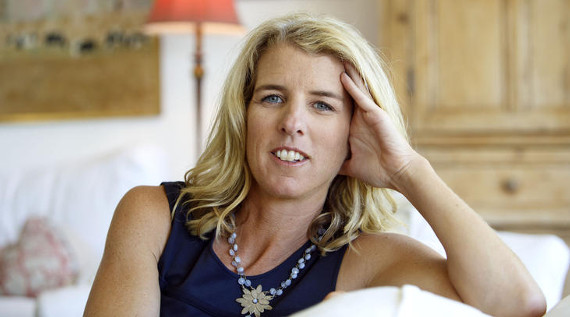
Newly elected governor to the Board of the Academy, director Rory Kennedy
(Photo credit: Ricardo DeAratanha of Los Angeles Times)
It’s been a rather quiet week on the non-fiction front. The biggest new to hit the net was the announcement that The Dissolve, a reliably astute source of online film criticism that was often linked to here, has digitally closed up shop after just two wonderful years. It was also revealed that the Academy of Motion Picture Arts and Sciences has elected its 2015–16 Board of Governors, among them LAST DAYS IN VIETNAM director Rory Kennedy. She’ll sit alongside Alex Gibney and Kate Amend as part of the Documentary branch. After the story broke on Friday, Rebecca Keegan of the LA Times reported on how the new elections continue to shift the demographics of the Academy.
Festival-wise, the 2015 Outfest Los Angeles LGBT Film Festival kicked off – both David Hudson (at Keyframe) and Basil Tsiokos (at What (not) To Doc) previewed the festival’s non-fiction offerings. Tsiokos also gave an outline of the non-fiction fare at the 32nd edition of the Jerusalem Film Festival which began on Thursday. According to Daniel Estrin in The Washington Post, late filmmaker Herz Frank and Maria Kravchenko’s BEYOND THE FEAR, “which profiles Yigal Amir, who assassinated Prime Minister Yitzhak Rabin in 1995, and his tabloid-fodder wife” has caused a “firestorm over the film’s compassionate look at his family broke out in the lead-up to its Israeli premiere”.
While Asif Kapadia’s AMY screened out of competition at Karlovy Vary International Film Festival, stateside its theatrical run expanded substantially, gleaning additional coverage from Ann Hornaday in The Washington Post, Chicago Tribune’s Michael Phillips, Christopher Campbell at Nonfics and Jeff Reichert at The Talkhouse. Filmmaker Magazine’s Howard Feinstein and Amy Taubin in Artforum both reviewed the doc, while at Movie Mezzanine, Christina Newland regards the film warmly while considering the delicacy in piecing together a musical martyr, finally deciding that “Kapadia’s film is an honest, maybe necessarily imperfect vision of Amy, colored with warmth and humanity”. Michael O’Sullivan also interviewed Kapadia about the film for The Washington Post.
Continue reading…
What could be more patriotic than hunkering down in a dark theater for some good, old fashioned non-fiction cinema? According to Tom Brueggemann at Indiewire, this past weekend a substantial amount of American’s did just that, with Asif Kapadia’s AMY taking in a commendable $222,105 on just 6 screens, with plenty more to follow. Meanwhile, in the United Kingdom the film broke records as the highest grossing non-fiction film on its opening weekend according to Catherine Shoard in The Guardian. Having premiered to rave reviews at Cannes, the film continues to garner critical acclaim. In just the past few days AMY was selected by Jonathan Romney as Film Comment’s Film of the Week, Jane Giles featured the film in Sight & Sound, Joe Coscarelli wrote at length about it in The New York Times and David Edelstein said Kapadia’s portrait was “alternately thrilling and devastating” at Vulture. The praise continues from Flavorwire’s Jillian Mapes, The Guardian’s Mark Kermode, RogerEbert.com’s Susan Wloszczyna and Little White Lies’ Sophie Monks Kaufman, while Steven Hyden at Grantland and Luke Goodsell at Movie Mezzanine deepened the critical conversation with their own substantial reflections on the film.
In addition to reviewing AMY for The Dissolve, Keith Phipps also interviewed by producer James Gay-Rees and director Asif Kapadia at length about how they came to know of their future subject and how they got involved in trying to tell her tragic story. Similarly, Mekado Murphy interviewed Kapadia for The New York Times, and their conversation is paired with a trailer overdubbed with a brief audio commentary by Kapadia himself. Manori Ravindran also have the pleasure of speaking with Gay-Rees about AMY at Realscreen.
Continue reading…
Each year the Academy of Motion Pictures re-evaluate their rules for Oscar consideration and the like. Last Tuesday, it was announced that the Documentary Short Subject shortlist would be changing from a maximum of 8 films to 10, and the actual nominations would be set at a static 5 films, rather than fluctuating from 3 to 5 films each year. Anne Thompson reported on the list of Oscar rule changes for Indiewire, while Daniele Alcinii wrote about the news for Realscreen.
While major awards are always a fast track to cinematic cultural recognition, Anthony Kaufman pored over whether celebrity supporters actually have any impact on whether or not documentaries find a market or not for Indiewire. Unsurprisingly, filmmakers like Rachel Boynton who directed BIG MEN and had Brad Pitt as a supported found that “Basically, it makes people feel like your film will be taken seriously by the world when it’s finished. And that can be the difference between getting a ‘no’ and getting a ‘yes.'”
Contemplating film form rather than marketing, Ben Kenigsberg wrote a feature in The New York Times that sees filmmakers such as CARTEL LAND director Matthew Heineman and doc curators such as our own Thom Powers speaking on manipulative, often aesthetically based choices made when constructing non-fiction features. Joe Berlinger, of films like BROTHER’S KEEPER and PARADISE LOST, thinks there needs to be a balance of intimacy and aesthetics, stating, ““The more you treat your interview and your documentary situation like a film set, the less people are comfortable, and the less spontaneous action you can film.”
Continue reading…








